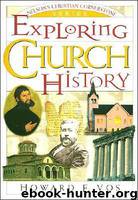Exploring Church History by Howard F. Vos

Author:Howard F. Vos
Language: eng
Format: mobi
Publisher: Thomas Nelson
Published: 2013-03-25T04:00:00+00:00
Part 6 - The Church in America
Twenty-Five - An Era of Settlement
The Seventeenth Century
The Spanish
WHEN Columbus sailed westward in 1492, he was not merely looking for a new route to the Indies. He hoped to discover new sources of wealth to finance another Crusade against the Muslims and to link up with leaders of the Far East to establish a massive pincers movement against the Muslim Middle East.1 Moreover, when he came upon the non-Christian tribes of the New World, his religious inclinations predominated again. He and Ferdinand agreed that measures should be taken to protect, convert, and educate the Indians.
Soon Spanish priests began to accompany the explorers and conquerors. A bishopric was established at Santo Domingo in 1512, another in Cuba in 1522, with others following in rapid succession. The University of Mexico and the University of San Marcos, in Lima, were both founded in 1551; others were built elsewhere in Latin America as the need arose. When one recalls that the Spanish usually sent their sons back to Europe for education, it will be clear that these New World institutions were especially for the training of the natives.
Admittedly, the Spanish oppressed and maltreated the Indians over the centuries, but it is nevertheless true that the church and crown made sincere and expensive moves to protect the natives in the early days. Shortly after the death of Luther, the Spanish settled Florida (St. Augustine, 1565) and then advanced into New Mexico and Texas. They were establishing their missions in California while Jefferson was writing the Declaration of Independence. Portuguese settlement in Brazil began in 1532, and of course the Roman church was established there. Thus, all of Latin America and part of the present area of the United States responded to the religious efforts of Spanish and Portuguese priests.
The French
Although the French became interested in North America very early, they were not able to establish a permanent colony until 1608—at Quebec. Thereafter, French explorers and missionaries ranged across the northern part of the continent and throughout the Mississippi valley down to the river’s mouth in Louisiana. They set up mission stations, trading posts, and forts wherever they penetrated, and established friendship with many Indian tribes. But the paucity of French settlers in the New World, inadequate colonial policies, and the defeat of French forces ultimately brought an end to the French Empire in North America (in 1763) and the effects of French Jesuit work everywhere except in Quebec and Louisiana.
The English
At Jamestown in 1607, the English established their first successful colony. Planted by the Virginia Company, the colony was basically an economic venture; but the Anglican church was established there to meet the spiritual needs of the colonists, who were members of the Church of England. About the same time, a group of Pilgrim separatists, persecuted in England because of their religious views, took refuge in Holland. Finally they made arrangements with the London Company to settle in Virginia. But the Mayflower and the Pilgrims landed at Plymouth, Massachusetts, instead, introducing Congregationalism to New England in 1620.
Download
This site does not store any files on its server. We only index and link to content provided by other sites. Please contact the content providers to delete copyright contents if any and email us, we'll remove relevant links or contents immediately.
| Buddhism | Christianity |
| Ethnic & Tribal | General |
| Hinduism | Islam |
| Judaism | New Age, Mythology & Occult |
| Religion, Politics & State |
Cecilia; Or, Memoirs of an Heiress — Volume 1 by Fanny Burney(32558)
Cecilia; Or, Memoirs of an Heiress — Volume 2 by Fanny Burney(31956)
Cecilia; Or, Memoirs of an Heiress — Volume 3 by Fanny Burney(31942)
The Secret History by Donna Tartt(19092)
Sapiens: A Brief History of Humankind by Yuval Noah Harari(14390)
Leonardo da Vinci by Walter Isaacson(13337)
The Radium Girls by Kate Moore(12029)
Sapiens by Yuval Noah Harari(5372)
How Democracies Die by Steven Levitsky & Daniel Ziblatt(5219)
The Wind in My Hair by Masih Alinejad(5095)
Homo Deus: A Brief History of Tomorrow by Yuval Noah Harari(4918)
Endurance: Shackleton's Incredible Voyage by Alfred Lansing(4783)
Man's Search for Meaning by Viktor Frankl(4607)
The Silk Roads by Peter Frankopan(4535)
Millionaire: The Philanderer, Gambler, and Duelist Who Invented Modern Finance by Janet Gleeson(4478)
The Rape of Nanking by Iris Chang(4214)
Joan of Arc by Mary Gordon(4113)
The Motorcycle Diaries by Ernesto Che Guevara(4102)
Stalin by Stephen Kotkin(3969)
